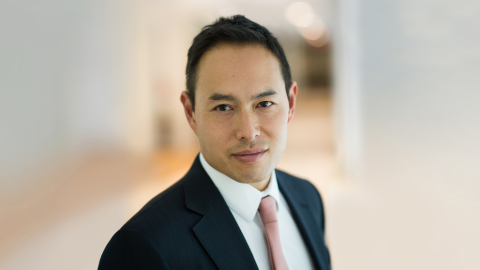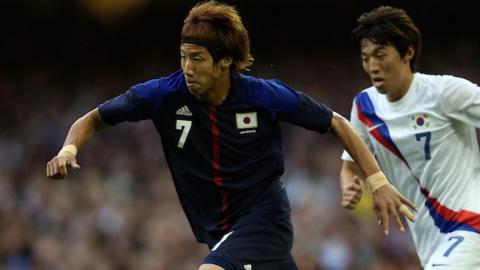Beyond the headline events at the 17th Asian Games taking place now through October in Incheon, South Korea, other contests are being played out among old rivals -- including the South Korean side and a 273-member delegation of North Koreans, one of whom set a new world record in weightlifting. While the two Koreas are still formally at war with each other, however, the fiercer contest is between the South Korean hosts and Japan.
The tensions are not just due to the fact that the two uneasy neighbors will almost certainly fight it out for second place in the final medal tally behind China, or because these two soccer powerhouses of Asia will be meeting in a quarterfinal on Sept. 28.
Political relations between Seoul and Tokyo have reached a generational low, mainly due to South Korea's insistence that Japan has not shown adequate remorse over wartime issues such as the Japanese military's use of Koreans as "comfort women," and Tokyo's suspicion that its neighbor is using these and other historic issues to undermine relations with its long-time rival.
Dangerous deadlock
Wherever the balance of contemporary fault lies in the offering or acceptance of apologies, and even though South Korean anger over wartime issues is genuine, the costs for Seoul of its inability to let go of the past are mounting. This stems from its stubborn insistence on keeping history at the front and center of bilateral relations with Tokyo.
On the eve of the Asian Games, in late September, Japanese Prime Minister Shinzo Abe wrote to Korean President Park Geun-hye entreating her to accept yet another offer for the two leaders to meet on the sidelines of an international meeting before the year's end. The Japanese leader had verbally expressed his desire for a one-on-one meeting with his South Korean counterpart several times, although this was the first formal, written request. It would undoubtedly be to South Korea's benefit, and to the region as a whole, if Park were to take up the offer.
To be sure, Japan-Korea rivalry is nothing new. Having been colonized by Japan from 1910 to 1945, modern Korean nationalism was founded on opposition to Japanese rule. For example, the March 1st Movement in 1919, the first expression of Korean nationalism on a mass basis, was understandably characterized by powerful anti-Japanese sentiment. More recently, the Roh Moo-hyun and Lee Myung-bak administrations also experienced tense moments with Tokyo.
But Park's insistence from the start of her term in early 2013 that progress in bilateral relations would depend on further demonstrations by the Abe government of sincere remorse about the past goes beyond demands by her recent predecessors.
If strained bilateral relations had no more profound or broader consequences, then Seoul's cold-shouldering of Tokyo would not be of serious concern. But this is not the case when it comes to this rivalry. Unable to rise above the political spats over history, Seoul has signaled strong disapproval of Abe's plans for Japan to play a more assertive strategic role in the region.
Time for change
The chronically cowering and penitent Japan that was so reassuring to neighbors in the decades immediately after the war is no longer the kind of Japan that serves the region's interest. The U.S.-led alliance system that became the primary factor for stability and security in Asia is now being challenged by China's military rise. If the alliance system is to endure by adapting to the rise of a great power outside that system, key regional allies will have to carry more of the security burden from America than they have in the past. And with a Japanese navy and air force that are probably still superior to that of China's, Japan is undoubtedly the key regional player in terms of its enhanced role within the U.S.-Japan alliance and as a stand-alone military power.
This explains the enthusiasm for a more assertive Japan among countries that also suffered greatly under Japanese imperialism, such as Singapore, the Philippines, Malaysia, Indonesia, Australia and, of course, America. Indeed, enthusiasm for Abe's Japan, also for these same strategic reasons, is evident in other countries, such as India and Vietnam.
Most countries of the region, including South Korea, are becoming more reliant on Japan's strength and growing confidence to help bulk up the U.S.-led strategic order. Yet Seoul could well raise American as well as regional eyebrows as it projects a diplomacy that appears more comfortable with China's real military rise than with Japan's imagined one. While China's military budget has increased by double digits per annum for the past two decades -- at rates exceeding that of its economic growth and in an opaque manner -- Japan under Abe increased military spending by only 0.8% on the year in 2013 and is seeking a 2.4% increase in 2014.
Moreover, while Japan and South Korea have an ongoing dispute over the Dokdo/Takeshima Islands in the Sea of Japan (which Koreans call the East Sea), the strategic parameters of this dispute are limited. In contrast, China's territorial claims in the East and South China seas would fundamentally rewrite the strategic order in Asia if Beijing succeeds in making good these claims.
It is little wonder that Beijing clearly does what it can to encourage the rift between these two democratic neighbors and American allies. Last January, for example, China opened a museum in Harbin, Heilongjiang Province, to honor Korean independence activist Ahn Jung-geun, embellishing the more modest suggestion by Park in her mid-2013 visit of a plaque to commemorate Ahn. In 1909, Ahn assassinated visiting Japanese statesman Hirobumi Ito at Harbin railway station and was subsequently hanged in a Japanese prison. The memorial infuriated Japan; but South Korea hails Ahn as a hero -- and now, it seems, so does China.
A summit between the South Korean and Japanese leaders would not automatically resolve their differences. But it would be a far more constructive approach by Seoul than its current tactic of criticizing and dismissing the Abe government from afar. By accepting the invitation, it would be a meaningful gesture for Seoul to offer Tokyo -- and indeed, the world -- and an effective way to send the message that South Korea is prepared to move forward on a troubled relationship that it has remained mired in the dark side of history.














